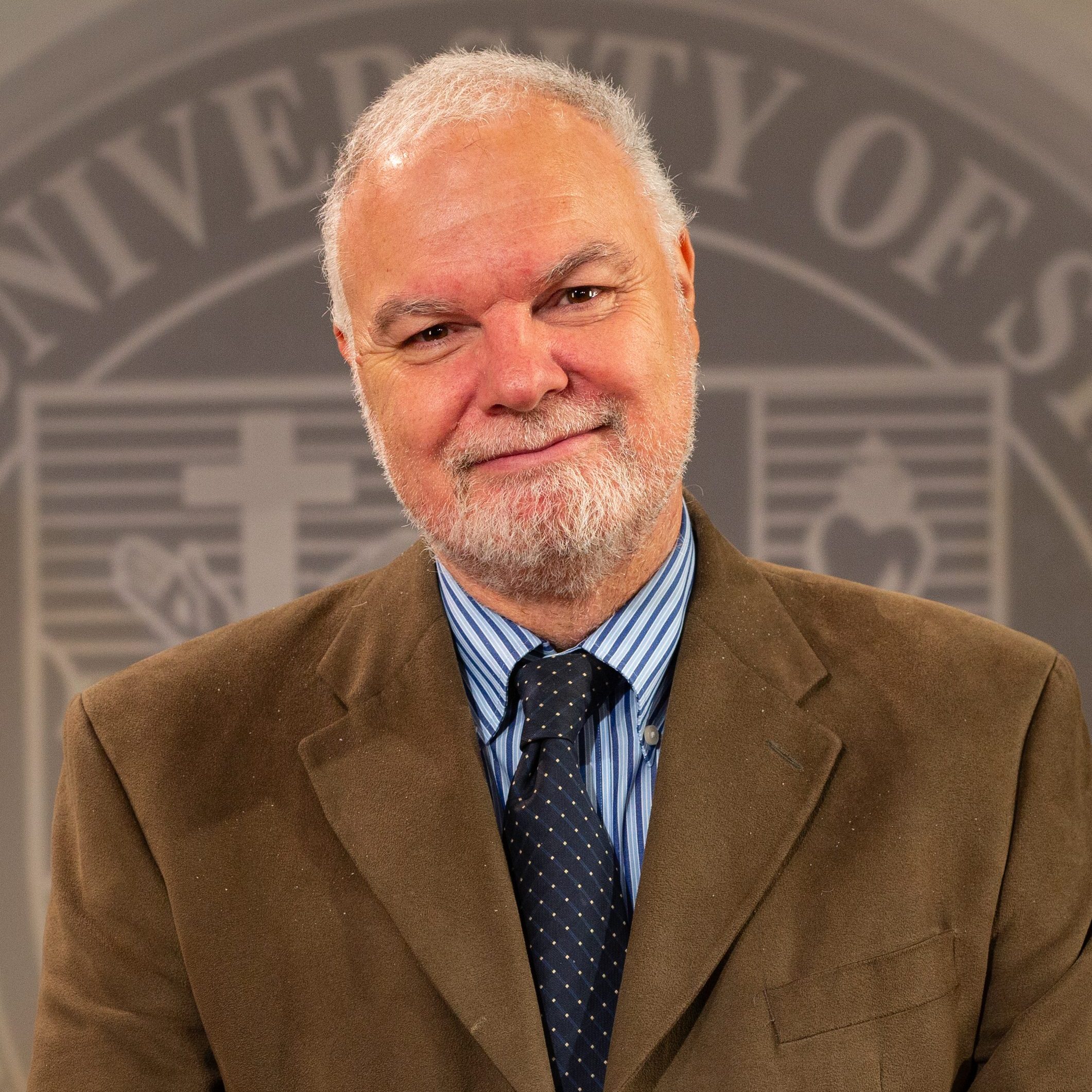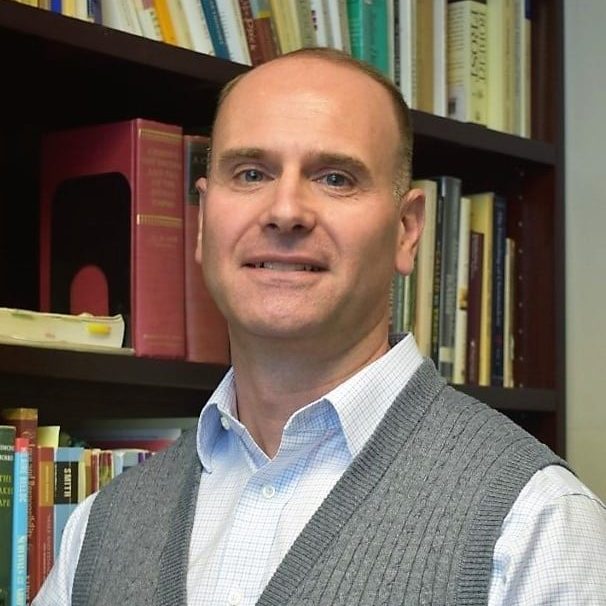
Dr. Bob Rice
Professor of Catechetics
Director of MACE (online)
Through an intimate relationship with Jesus Christ, I desire to share the love of God to everyone I encounter through my passion, wisdom, creativity, and humor, and empower others to do the same. “That I might teach transgressors your ways, and sinners may return to you” (Psalm 51:13).
This mission statement explains the driving force behind everything I do, whether it is through teaching, preaching, writing, or music.
The heart of what I do is proclaiming and explaining God’s Word. My favorite quote from the Catechism of the Catholic Church is, “The whole concern of doctrine and it’s teaching must be directed to the love that never ends” (CCC 25). My prayer is that I might spend my short time on this earth helping others encounter that love through what I say and do, starting with my wife and children.
- PhD in Theology, Liverpool Hope University, Liverpool UK, June 2016
- Masters of Arts in Theology and Christian Ministry, Certification in Catechetics, Franciscan University of Steubenville, 1997
- Bachelor of Arts, major in Theater, Rollins College, Winter Park, Florida 1994
- Associate Professor of Catechetics, Franciscan University of Steubenville, 2004 to present
- Director of Masters of Arts in Catechetics and Evangelization, 2013 to present
- Head of Youth Ministry Concentration, 2004 to present
- Worship Leader, Youth and Adult Conferences, Franciscan University of Steubenville, 2005 to present
- Executive Producer for Franciscan University web-series, 2014 to present
- LIFE TEEN Northeastern Area Coordinator, 2001-2004
- Director of Youth Ministry, Church of St. Ambrose (Latham, New York) 1997-2004
- National Initiative for Adolescent Catechesis
- Servants of the Savior (a FUS men’s community), Household Advisor
- “Talking to Young People about Same Sex Attraction” The Sower Review, January 2014 The moral teaching of the Church is clear on this matter; how we should go about sharing that teaching is not. Here are a few key things to keep in mind as you address this important and sensitive topic.
- “How the Catechism Made Me Catholic” Shalom Tidings, August 2013 A personal story on how the Catechism changed my life, and an encouragement to not just treat the Catechism like a reference manual but as, “a blueprint for the heart of Christ.”
- “Proclaiming the Bad News to Teenagers” The Sower Review, April 2013 Talking about hell can pose a challenge for those who work with young people today. The difficult answers to questions often asked by teenagers on this subject often discourage catechists from speaking to youth about this topic. But if young people don’t understand the horrors of hell, they can never appreciate what Christ went through to bring them to heaven. Or to put it another way, the Good News isn’t really good unless the bad news is really bad.
Full List
- “Holy Apps!” The Sower Review, January 2013 A recent study found that a third of teenagers own an iPhone, another 23% own an iPad, and it’s hard to tell how many teens own an iPod (some statistics put it as high as 76%.) Statistics for young adults are harder to come by but are generally assumed to be higher. Though every teen or young adult you minister might not have a mobile or tablet device, you can bet that many, if not most, do.You might be able to introduce some apps that could actually lead them to holiness.
- “Crucified, Died, and Risen” I Believe, Franciscan Media, January 2013 Every commercial on TV tells us that suffering is bad and all we need to do is buy something to make it go away. That often leaves no room for the cross. We can even go so far as to justify our desires by thinking that Christ suffered so we don’t have to. When we see Jesus that way, we treat Him more as our soother than our Savior. But Jesus never promised to take away our pain. He promised to redeem it.
- “One Lord” I Believe, Franciscan Media, October 2012 The definition that Scripture uses for the word “Lord” can be summed up in one word: “God.” When the Hebrew Scriptures were translated into Greek, the divine name YHWH was translated into Kyros, or “Lord.” To say that Jesus is Lord is to say that Jesus is God.
- “Thinking Win/Win with Your Volunteers” The Sower Review, October 2012 Attracting volunteers to your ministry is a daunting challenge, but it can be done. One way of doing that is to think “Win/Win.” A ministry that is as concerned with the positive experience of its volunteer as it is with it’s ministry to young people becomes a dynamic and enticing environment that attracts both youth and adults alike.
- “The Life Everlasting” I Believe, Franciscan Media, July 2012 The life we live on earth is fragile, fleeting, and temporary. This life is a tent. Eternity is a mansion. When all of our focus is on this life, it leaves little (or no) time to think about or prepare for the next. What would our lives look like if we spent as much time and energy “building up” our heavenly home as we do our earthly one?
- “Will You Love Me?” The Sower Review, April 2012 When St. John Bosco famously said, “Love, and they will follow you anywhere,” he wasn’t talking about relational manipulation. He was speaking the truth. Teenagers, then and now, desire true friendships and respond to real love. One thing is sure: postmodern teenagers feel more than they think. The previous generation of youth could accept a rational explanation of the Gospel message as the entry point into the community of faith. Today’s youth need to first feel that they belong before they will be willing to open their minds to the truth.
- “Judge and King” I Believe, Franciscan Media, March 2012 This life will end, no matter what the pharmaceutical companies say. And Scripture makes it clear that at our end we will come face to face with Jesus Christ, our judge and King. That leaves us with choice. We can persist in our sin and receive the judgment we deserve, or we can accept the mercy offered through Jesus Christ and live a life of love. The Catechism tells us, “By rejecting grace in one’s life, one already judges oneself.” (CCC 679)
- “Not Young Adults, but Emerging Adults”, The Sower Review, January 2012 What is a “young adult?” This is the question that plagues many people in young adult ministry in the United States. Young adults are often described by their age range: 18 to 30 years old. But Christian Smith, author of Souls in Transition: The Religious and Spiritual Lives of Emerging Adults, suggests the term young adult is a misnomer. He proposes we call this age group emerging adults. “Rather than viewing these years as simply the last hurrah of adolescence or an early stage of real adulthood, (this title) recognizes the very unique characteristics of this new and particular phase of life.”
- “Saints and Superheroes”, The Sower Review, October 2011Movies and stories about superheroes are all the rage with young people today. As catechists, we can use those stories to point them to the real superheroes— the saints.
- “Using the YOUCAT”, The Sower Review, July 2011 Pope Benedict XVI has endorsed the YOUCAT for youth catechesis. This article takes a look at ways to use it most effectively.
- “Working with Your Pastor”, The Sower Review, April 2011 The relationship between a pastor and his youth minister is one of the most unique relationships in a parish staff. When communication breaks down, do does the ministry. This article helps youth ministers better understand their pastors and gives advice on ways to strengthen their relationship with them.
- “Sharing the Gospel Message with Adolescents, Part II”, The Sower Review, January 2011 This article is a follow up to the previous article, focusing on the 3rd and 4th reasons for the Incarnation as described in the Catechism of the Catholic Church.
- “Pastors and Youth Ministers”, Formed Magazine, November 2010 The relationship between a pastor and his youth minister is one of the most unique relationships in a parish staff. When communication breaks down, do does the ministry. This article helps youth ministers better understand their pastors and gives advice on ways to strengthen their relationship with them.
- “Sharing the Gospel Message with Adolescents”, The Sower Review, October 2010 The Catechism asks a question so simple that many of us have never thought to ask: “Why did the Word become flesh?” The amazing answer is the heart of the Gospel message and the missionary discourse that we invite teenagers to hear and accept in their lives.
- “An Organic and Comprehensive Ministry for Youth”, The Sower Review, July 2010 The USCCB document, Renewing the Vision, listed eight necessary components of youth ministry: advocacy, catechesis, community life, evangelization, justice and service, leadership development, pastoral care, and prayer and worship. But many don’t understand how they should connect with each other.
- “Avoiding Burnout in Youth Ministry”, Formed Magazine, June 2010 We are called to be set on fire with the Holy Spirit. This fire burns from within our hearts and fuels our every action. It waits for the Lord to lead, then follows in His way. It is a holy fire. But there is another kind of fire. This is the fire of our own effort. It was the fire that drove the Israelites to try to take the promised land by force after God told them not to (and tens of thousands of them died.) It is a fire driven by our pride. It is a fire driven by impatience. It’s the fire that burns us out.
- “Inserting Teens into the Mystery of the Gospels”, CatholicYouthMinistry.com, March 2010 Encountering Christ in the Gospels helps us to encounter Him more deeply in the Sacraments, especially the Eucharist. Seeing his face in the Scriptures helps us to see his face in each other, the community formed by the love of God. We must connect the Gospels to the Sacraments and the community or else we are just “telling” them about the mystery instead of “inserting” them into it.
- “Ministering to Youth in a Media Saturated Culture”, The Sower Review, April 2010 “Over the past five years, young people have increased the amount of time they spend consuming media by an hour and seventeen minutes daily, from 6:21 to 7:38—almost the amount of time most adults spend at work each day, except that young people use media seven days a week instead of five.” So how can we preach the message of God’s love in the heart of this agorà? I would suggest twopoints. First, we must help them understand the many messages they receive from the media. Secondly, we must create new media to share with them the love of God.
- “Drawing Teens Into A Time Of Mystagogy”, CatholicYouthMinistry.com, February 2010 The word mystagogy means “into the mystery”, and in the language of the Church today refers to a specific moment of the baptismal catechumenate, the process celebrated by the RCIA and the RCIC. The General Directory of Catechesis encourages us “to draw inspiration from this preparatory school for Christian life and to allow itself to be enriched by those principal elements which characterize the catechumenate,” (GDC 91) even though we are mostly dealing with folks who are baptized. Our catechetical work with teenagers should incorporate all the elements of the catechumenal program.
- “The Importance of Studying Youth Culture”, Formed Magazine, January 2010 Culture is created by men and women, and men and women are made in the image and likeness of God. So we must have hope that somewhere within the culture is the image of God. It’s our job to find it. We must “lay bare the seeds of the Word” that is buried in their culture. Is it in a song lyric? A storyline? An image on the internet? So we “dig in” to culture. We gently sift through its sands like a paleontologist searching for dinosaur bones. We do it gladly and reverently, being careful not to destroy the very thing God wants us to find.
- “Education vs. Transformation”, The Sower Review, January 2010 To parish youth ministers, the NDC lays out a challenge that they need to see their work as a catechetical program. Because if their parent’s aren’t active in passing the faith and they aren’t in a Catholic school, then the youth ministry environment is the only place where they will experience the “intimacy with Christ” that catechesis provides. Whether in the parish or the school, effective catechesis must be supported by other components of a comprehensive pastoral ministry for youth.
- “Unfair Advantage”, The Sower Review, July 2009 We confuse the virtue of justice, “the constant and firm will to give their due to God and neighbor” (CC1807) with fairness, “free from favor toward either or any side”. God’s pedagogy is not about fairness. It is about justice. And we get into real problems in ministry when we confuse the two.
- “Soul Searching for Youth Ministers”, The Sower Review, April 2009 In 2005, the results of a groundbreaking study of the religiosity of adolescents in the United States was published in Soul Searching: The Religious and Spiritual Lives of American Teenagers by Christian Smith. Catholic teenagers fared quite badly compared to their Protestant counterparts when it came to living out their faith or articulating what they believe. The alarming conclusion the author makes is, “The language, and therefore experience, of Trinity, holiness, sin, grace, justification, sanctification, church, Eucharist, and heaven and hell appear… to be supplanted by the language of happiness, niceness and an earned heavenly reward.”
- “Communicating our Love for Adolescents”, The Sower Review, January 2009 St. John Bosco wrote that it is important “not only that the boys be loved, but that they know that they are loved.” Love must be communicated not only between a parent and child, but also between the catechist and the one receiving the faith. Gary Chapman, author of The Five Love Languages of Teenagers, writes, “If the child’s emotional need for love has not been met, then the theological idea of a loving God will have little meeting for the teenager.”
- “Ministering to Millennials”, The Sower Review, October 2008“What matters is to evangelize man’s culture and cultures not in a purely decorative way, as it were, by applying a thin veneer, but in a vital way, in depth and right down to their very roots.” (Paul VI, Evangelii Nuntiandi) That kind of ministry has to begin with an understanding that the culture the youth live in now is not the culture we lived in when we were youth. We can’t use our own preferences of experiences as a litmus test to think what will or won’t work with teenagers today- we must be students of their culture.
- “Helping Youth Encounter Christ in the Gospels”, The Sower Review, July 2008 “The definitive aim of catechesis is intimacy with Christ.” (John Paul II, Catechesi Traedae) The best way to introduce teens to Jesus is through the Gospels, which have a “special preeminence” in all of scripture. (Dei Verbum 21). But many times we share Gospel stories of Jesus to make an intellectual point instead of a relational encounter. What He said is important, but only if we fall in love with Who He is.
- “Christ’s Invitation to Young People”, The Sower Review, April 2008 “Good Teacher, what must I do to inherit eternal life?” (Mark 10:17) Jesus did not give him a soft or easy answer. As catechists, we must not fall into the temptation to water down the dramatic invitation of Christ to something more “reasonable” and easier to follow: an invitation to be “good”, not “great”. “The heart of catechesis is the explicit proposal of Christ to the young man in the Gospel; it is a direct proposal to all young people appropriate to young people, and with considered understanding of their problems.” (GDC 183)
- “The Missionary Nature of Youth Catechesis”, The Sower Review, January 2008 Many adults who try to pass the faith on to youth feel like they are speaking to people from a different planet. The General Directory of Catechesis tells us that to pass the faith on to young people, we “must adopt a missionary dimension rather than a strictly catechumenal dimension.” (GDC 185) As catechists to youth, we cannot envision ourselves as people who are teaching a group of “little adults”. Instead, we must view ourselves as missionaries to a foreign culture.
- “A New Pentecost for Catechesis”, The Sower Review, October 2007 In Catechesi Tradendae, John Paul II wrote, “I invoke on the catechizing Church this Spirit of the Father and the Son, and I beg him to renew catechetical dynamism in the Church.” (CT 72) This article delved into the role of the Holy Spirit in the work of catechesis, and suggested ways to bring about a Spirit driven “catechetical dynamism” in ministry today.
- “Developmental Issues in Youth Catechesis”, The Sower Review, October 2007 This article provided a basic overview of the developmental differences between pre-adolescents (10-14 years old), adolescents (15-18 years old), and young adults (19 years old to mid 20s), with strategies on how to effectively minister to those different age groups.
Books:
- “40-Day Spiritual Workout for Catholics” Franciscan Media, January 2013 A 40-Day Spiritual Workout for Catholics is designed to bring about deeper transformation and conversion in your life. Rice challenges his readers to spend forty days developing a habit that will last a lifetime. Each of the forty days includes a Scripture quote, a quote from a saint or the Catechism of the Catholic Church, a short reflection, thought-provoking questions, and a prayer.
- “Between the Savior and the Sea”, bob-rice.com, February 2011 This is a novel that focuses on the special relationship that Jesus had with Peter, based on the Gospel stories. The goal is to bring the reader to the Sea of Galilee in first century AD, and experience the life of Christ from Peter’s point of view.
- “The Beginner’s Gospel”, Monster Ants Press, 2004 The Gospel of Mark is the simplest and shortest of the four Gospels. Some historians argue it was one of the first written, and that it was used for initiating new believers into the faith. “The Beginner’s Gospel” is a 5-week bible study that leads a reader through this Gospel, and helps the reader understand the basics of the life of Christ, and how it applies to us today.
- “Basic Spiritual Workout”, Servant Publications, 2002 This book is a “teen-friendly” explanation of the prayer section of the Catechism of the Catholic Church, using lots of stories and cultural examples to help youth and young adults to grow stronger in their relationship with Christ.
- “35 Day Spiritual Workout”, YOU! Press, 1998 Written for a young person who has come off their first retreat or spiritual experience, “A 35 Day Spiritual Workout” is a 35-day devotional that introduces the reader to the basics of the Catholic Faith through Scripture readings, Catechism references, and quotes from the saints.






























